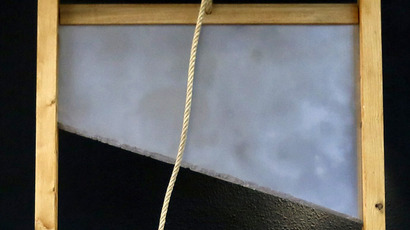'Torture' punishment: Saudi sentence man to be paralyzed

A Saudi Arabian court has allegedly ordered a man to be paralyzed for stabbing his friend 10 years ago. The defendant’s family will have to pay out $266,000 or have their son face a sentence decried as “torture” by Amnesty International.
Twenty-four-year-old Ali al-Khawaher stabbed his friend in the
back when he was 14, putting the victim in a wheelchair for the
rest of his life. Islamic Sharia law, which is enforced in Saudi
Arabia, allows for ‘eye-for-an-eye’ punishment in such cases, or
monetary compensation for the victim.
The court ruling provoked the ire of international human rights
organization Amnesty International, which likened the sentence to
torture.
"Paralyzing someone as punishment for a crime would be
torture," Ann Harrison, Amnesty's Middle East and North Africa
deputy director, said in a statement. "That such a punishment
might be implemented is utterly shocking, even in a context where
flogging is frequently imposed as a punishment for some offenses,
as happens in Saudi Arabia."
Harrison stressed it was high time the “authorities in Saudi
Arabia start respecting their international legal obligations and
remove these terrible punishments from the law.”
Reports say that al-Khawaher has been awaiting his punishment in
jail for the past 10 years.
“Ten years have passed with hundreds of sleepless nights. My
hair has become grey at a young age because of my son’s
problem,” al-Khawaher’s mother told the Saudi Gazette. “I
have been frightened to death whenever I think about my son’s fate
and that he will have to be paralyzed.”
Furthermore, she told Arabic language news daily al-Hayat that
previously the compensation for the family of the victim had been
double but was later reduced. She told the publication that the
family did not even have a tenth of the 1 million Saudi riyals
($266,000) necessary to save their son from paralysis.
Corporal punishment is common in Saudi Arabia, where flogging is an
obligatory punishment for a number of offences. Additionally,
amputation is practiced as a punishment, but is mainly confined to
cases of theft.
Al-Khawaher’a case is known as gisas (retribution), which can incur
such punishments as eye-gouging, tooth extraction and execution
where the original crime committed was murder. However, the victim
can call for a pardon or monetary compensation instead of corporal
punishment.














